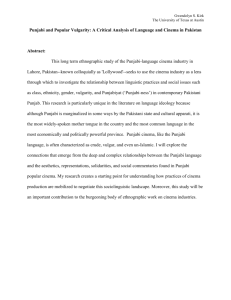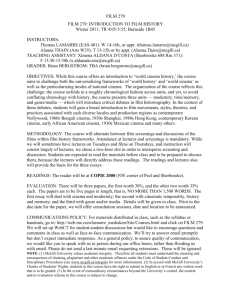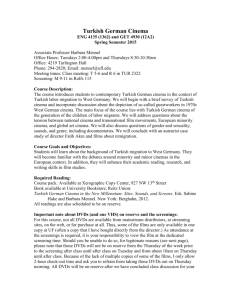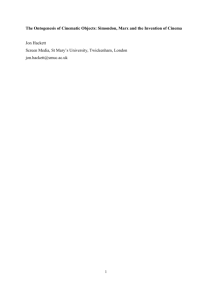FI587: Extreme Cinema (H-level)
advertisement
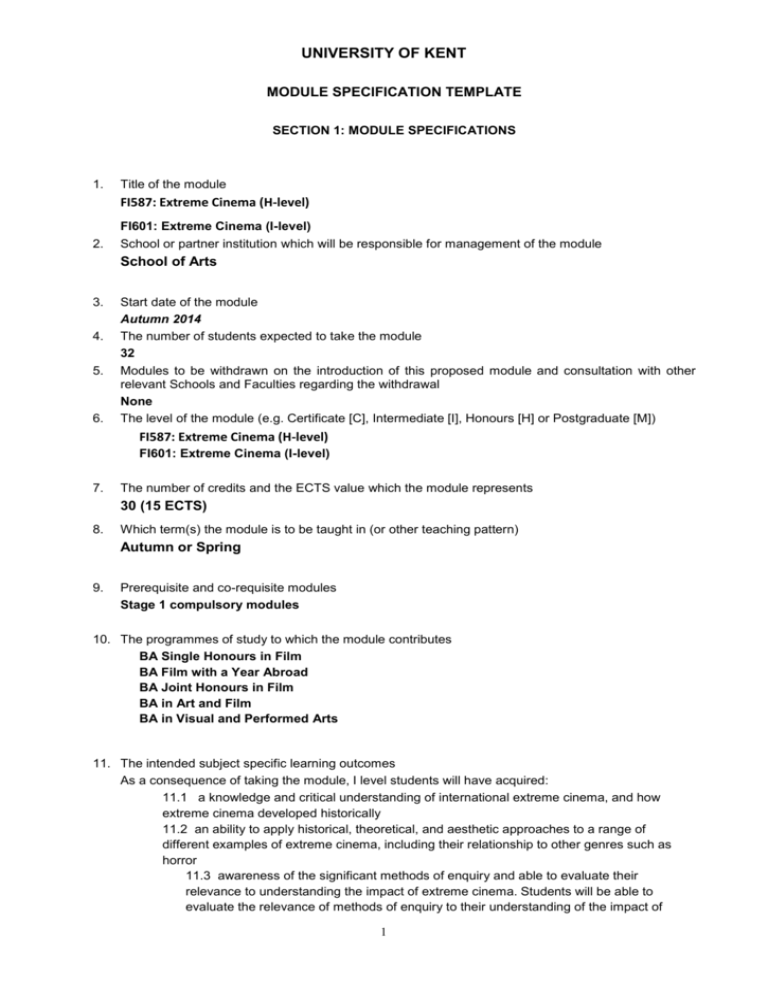
UNIVERSITY OF KENT MODULE SPECIFICATION TEMPLATE SECTION 1: MODULE SPECIFICATIONS 1. Title of the module FI587: Extreme Cinema (H-level) 2. FI601: Extreme Cinema (I-level) School or partner institution which will be responsible for management of the module School of Arts 3. 4. 5. 6. Start date of the module Autumn 2014 The number of students expected to take the module 32 Modules to be withdrawn on the introduction of this proposed module and consultation with other relevant Schools and Faculties regarding the withdrawal None The level of the module (e.g. Certificate [C], Intermediate [I], Honours [H] or Postgraduate [M]) FI587: Extreme Cinema (H-level) FI601: Extreme Cinema (I-level) 7. The number of credits and the ECTS value which the module represents 30 (15 ECTS) 8. Which term(s) the module is to be taught in (or other teaching pattern) Autumn or Spring 9. Prerequisite and co-requisite modules Stage 1 compulsory modules 10. The programmes of study to which the module contributes BA Single Honours in Film BA Film with a Year Abroad BA Joint Honours in Film BA in Art and Film BA in Visual and Performed Arts 11. The intended subject specific learning outcomes As a consequence of taking the module, I level students will have acquired: 11.1 a knowledge and critical understanding of international extreme cinema, and how extreme cinema developed historically 11.2 an ability to apply historical, theoretical, and aesthetic approaches to a range of different examples of extreme cinema, including their relationship to other genres such as horror 11.3 awareness of the significant methods of enquiry and able to evaluate their relevance to understanding the impact of extreme cinema. Students will be able to evaluate the relevance of methods of enquiry to their understanding of the impact of 1 UNIVERSITY OF KENT extreme cinema on the ways in which an audience engages with moving images As a consequence of taking the module, H level students will have acquired: 11.4 a systematic knowledge of contemporary international extreme cinema, and how extreme cinema has developed historically and have the ability to coherently articulate their understanding of the relationships between these developments 11.5 understanding of the different modes of analysis made possible by key methods of enquiry and be able to demonstrate their relevance to an understanding the impact of extreme cinema on both moving image making and the ways in which an audience engages with moving images 11.6 the ablility to devise a discussion of extreme cinema through a sustained a engagement with key methods of enquiry based on a synthesis of historical, theoretical, and aesthetic approaches 11.7 a greater understanding of the interplay between aesthetic choices and taste cultures through their research into/of relevant scholarly literature 12. The intended generic learning outcomes As a consequence of taking this module, I and H level students will: 1. Develop skills of critical and historical analysis of the moving image, together with generic intellectual skills of synthesis, summarisation, critical judgement and problem-solving, that will allow for the construction of original and persuasive arguments; 2. Develop the skills of communication, improving performance, problem-solving, and working with others; 3. Communicate effectively, using appropriate vocabulary, ideas and arguments in both a written and oral form; 4. Read critically, analyse and use a range of primary and secondary texts; 5. Locate and use appropriately a range of learning and reference resources (including moving image resources) within the Templeman Library and elsewhere, including the internet; 6. Employ information technologies to research and present their work. In addition, H level students will be able to: 7. Demonstrate the acquisition of an independent learning style; for example in the preparation and presentation of course work, in carrying out independent research, in showing the ability to reflect on their own learning and by mediating complex arguments in both oral and written form; 8. Approach problem-solving creatively, and form critical and evaluative judgments about the appropriateness of these approaches to a level where a substantial degree of autonomy and self-reflexive awareness is achieved in these tasks. 13. A synopsis of the curriculum Ensure this includes the key topics and that there is sufficient detail to give anyone delivering the module a clear framework from which to work. A general outline is required; it is not desirable, for example, to have a detailed weekly schedule of lecture topics. This course probes issues of extreme cinema, i.e., ‘arthouse’ films which, because of violent, sexual, or other iconoclastic content, form or style, have created critical or popular controversy. Representative topics include the aesthetics of violence and the ethics of 2 UNIVERSITY OF KENT representing and viewing pain, boundaries between erotic art and exploitation, disgust and the ‘unwatchable’, authorial performance and resistant spectatorship, reception studies and censorship. 14. Indicative Reading List Hawkins, Joan. Cutting Edge: Art-Horror and the Horrific Avant-Garde. Minneapolis: University of Minnesota Press. Staiger, Janet. Perverse Spectators: The Practice of Film Reception. New York: New York University Press, 2000. Vogel, Amos. Film as a Subversive Art. London: Weidenfeld and Nicolson, 1974. Williams, Linda. Hard Core: Power, Pleasure, and the “Frenzy of the Visible.” Berkeley: University of California Press, 1989. - - - , ed. Porn Studies. Durham, NC: Duke University Press, 2004. - - - . Screening Sex. Durham, NC: Duke University Press, 2008. 15. Learning and Teaching Methods, including the nature and number of contact hours and the total study hours which will be expected of students, and how these relate to achievement of the intended module learning outcomes Contact hours: 10 hours of lectures, one-and-a-half hours of seminars, 20 hours of screenings 25 hours of lecture and seminars, 20 hours of screenings Total contact over 12 weeks: 45 hours Average per week: 4 hours and 30 minutes Total study hours per week: 20 Total study hours: 300 Lectures will provide historical and theoretical assessments of the discussed trends in extreme cinema (Develops or tests Learning Outcomes11.1-11.7, 12.1-8); seminars will include discussions about the theoretical and/or historical material from the lectures and assigned readings and an examination of how the film screened before each of the meetings 3 UNIVERSITY OF KENT can be read from the perspective of the addressed critical framework, (Develops or tests Learning Outcomes11.1-11.7, 12.1-8). 16. Assessment methods and how these relate to testing achievement of the intended module learning outcomes H level assessment 20%: Seminar participation. tests Learning Outcomes 11. 4-7 and 12.1-8 30%: Essay #1 (2000 words). tests Learning Outcomes 11. 4-7 and 12.1-8 50%: Essay #2 (4000 words). tests Learning Outcomes 11. 4-7 and 12.1-8 I level assessment 20%: Seminar participation. tests Learning Outcomes 11. 1-3 and 12.1-6 30%: Essay #1 (1500 words). tests Learning Outcomes 11. 1-3 and 12.1-6 50%: Essay #2 (3500 words). tests Learning Outcomes 11. 1-3 and 12.1-6 I and H students will be given different lists of essay questions, appropriate to testing I and H level learning outcomes. 17. Implications for learning resources, including staff, library, IT and space Library has multiple copies of many of these books and relevant DVDs. Required reading for seminars (chapters and articles) will be posted to the module’s moodle page. 18. The School/ recognises and has embedded the expectations of current disability equality legislation, and supports students with a declared disability or special educational need in its teaching. Within this module we will make reasonable adjustments wherever necessary, including additional or substitute materials, teaching modes or assessment methods for students who have declared and discussed their learning support needs. Arrangements for students with declared disabilities will be made on an individual basis, in consultation with the University’s/ disability/dyslexia support service, and specialist support will be provided where needed. 19. Campus(es) where module will be delivered: Canterbury 4 UNIVERSITY OF KENT SECTION 2: MODULE IS PART OF A PROGRAMME OF STUDY IN A UNIVERSITY SCHOOL Statement by the School Director of Learning and Teaching: "I confirm I have been consulted on the above module proposal and have given advice on the correct procedures and required content of module proposals" ................................................................ .............................................. Director of Learning and Teaching/Director of Graduate Studies (delete as applicable) Date ………………………………………………… Print Name Statement by the Head of School: "I confirm that the School has approved the introduction of the module and, where the module is proposed by School staff, will be responsible for its resourcing" ................................................................. .............................................. Head of School Date ……………………………………………………. Print Name Module Specification Template Last updated February 2013 5
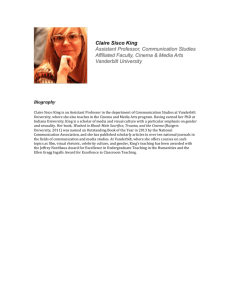

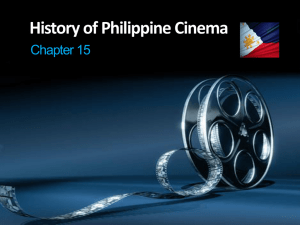
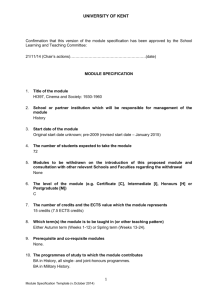
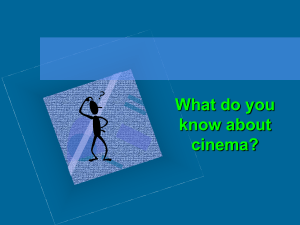
![[Lecture 4] from attractions to narrative integration 2012 for wiki](http://s2.studylib.net/store/data/005411128_1-612acd924ade64473e514356e531fdfd-300x300.png)

